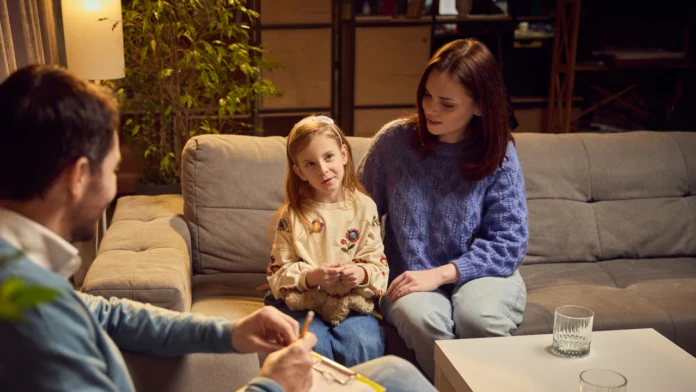Families seek therapy to help them work through problems, understand each other, and improve their functioning as a system. Families can learn skills to help them deal with conflicts, improve communication, and support each other’s mental and physical well-being.
Therapy.com is user supported. We receive a commission fee from purchases made through BetterHelp links.
Learn More
Licensed marriage and family therapists use various approaches when treating families based on the family’s specific needs. Examples of practical approaches include the following:
- Family systems therapy
- Internal family systems therapy
- Structural family therapy
- Multisystemic family therapy
- Behavioral couples therapy
- Functional family therapy
- Brief strategic family therapy
Therapy goals include educating the family about their issues or mental health disorders, teaching them coping skills, helping them find their strengths, and applying what they learn to daily family life. The ultimate goal is to reduce or eliminate stressors that cause discord in the family.
Finding a Family Therapist Near You
When searching for a therapist, it is good to evaluate your options. Rather than search “family counselors near me” and choose the first one that pops up, you want to find a therapist who is a good fit for your family. It’s OK to interview different therapists until you find the right one.
Licensed marriage and family therapists should have a master’s degree or higher from an accredited university, hundreds of hours of experience working in the field, and specialty areas. They should also have an active license from the state where they provide services.
Family marriage counselors must have credentials in marriage and family therapy, social work, certified professional counseling, or similar fields.
Therapy.com is user supported. We receive a commission fee from purchases made through BetterHelp links.
Learn More
Some tips for searching for a family therapist include:
- Ask friends or acquaintances for referrals
- Ask your family physician for a referral
- Check with your insurance company
- Ask for references and call them for feedback
- Look at their reviews online to learn about the experiences of other clients
Working with a marriage and family therapist benefits couples and families. You can expect to experience the following:
- Higher family cohesion
- Higher satisfaction with family roles
- Greater adaptability
- Improved problem-solving skills
- More effective parenting practices
- Fewer conflicts
- Healthier boundaries
- Improved mental health of each member
Therapy can also help family members with addictions get the help they need for recovery. It equips the family with resources to ensure success.
FAQs
To find a therapist, you can start by conducting an online search using terms like “family therapy near me” or “family therapist near me” but that’s just the beginning. You can also contact local treatment centers, your physician, family, and friends for referrals.
You can also search online directories through counseling associations. For example, the American Association for Marriage and Family Therapists has a therapist locator that features more than 15,000 professionals.
Marriage and family therapists have specialized master’s degrees, training, and experience in the field of couples and family therapies. Family counselors have a broader range of focus in general areas like mental health or substance use disorders.
In a family therapy session, your therapist will engage you in behavioral strategies that enhance your family’s strengths and skills as a unit.
Some sessions may include improving communication skills, role-playing activities, problem-solving, art therapy, vision boards, and feedback. Therapy sessions are safe and confidential, allowing each family member to express themselves.
Insurance coverage varies depending on the provider and the plan you enroll in. However, most insurance covers a specific number of family therapy sessions. It is imperative to check your insurance plan before you begin treatment.
Yes, military and family life counselors are specifically trained to help military and family members navigate the stressful issues associated with deployment. Stress management, grief, and relationship problems are just a few examples of the issues that counseling can address.
Types of Family Counselors and Their Specialties
Family counseling is something many different therapists can provide, which is why it is vital to learn the specialties of each to ensure they match your family’s needs. Working with the wrong therapist may hinder improvement in family dynamics.
Psychologists
Psychologists must have a Ph.D. from an accredited university and a state license proving they met all the requirements to practice counseling. Psychologists are often used for diagnostic assessment and evaluation. However, some may specialize in areas like family counseling.
Counselors or Therapists
Family therapists or counselors have different areas of focus and degrees, such as:
- Licensed Marriage and Family Therapists (LMFTs)
- Licensed Professional Counselors (LPCs)
- Licensed Clinical Alcohol and Drug Abuse Counselors (LCADACs)
Each type above is qualified to provide couples and family therapies. However, LMFTs have specialized education and training specific to the issues many families face today.
Social Workers
Licensed clinical social workers are trained in mental health and substance use disorders. They are legally able to provide therapy to individuals and families.
Most social workers are more trained to provide case management and advocacy, often involving working with families facing challenges. They are very effective in connecting families with community resources to help them achieve success.
Military and Family Life Counselors
Being on active duty can be stressful for the entire family, especially when deployed overseas. Military and family life counselors are trained specifically to help parents, siblings, and children cope with grief, loneliness, work and home stress, and many other issues military families face.
Holistic Therapists
Alternative and holistic therapies are becoming popular in treatment planning for a wide range of issues, including mental health and substance abuse in families.
Therapy.com is user supported. We receive a commission fee from purchases made through BetterHelp links.
Learn More
Holistic therapists can teach families stress management techniques, like deep breathing and meditation. They can also incorporate art, music, and animal-assisted therapies to help reduce tensions. You can do many holistic therapies as a family to strengthen your relationships.
When to Seek Counseling
It is easy to get stuck in a routine and not notice that your family has issues that are interfering with the overall health of the family. You may not know when to seek counseling for family issues, relationship problems, or significant life transitions.
If you notice any of the following, now may be a good time to seek therapy:
- Arguments between family members
- Inappropriate emotional expression
- Isolation or withdrawal from family interactions
- Constant disagreements about parenting
- Behavior problems at home or school
- Blended families with cultural differences
- Experiencing divorce, loss of a loved one, or moving
- Someone has a substance use disorder
There is no bad time to seek counseling, and you don’t have to wait until your challenges become devastating. Therapists can provide prevention techniques to help you avoid significant difficulties.
Family Therapy Approaches: Which One Is Right for You?
While numerous family therapy approaches have been in practice for decades, a few stand out from the rest. These therapy models typically focus on specific problems within the family unit.
Structural Family Therapy
Structural family therapy has various stages that focus on getting to know each family member and their role within the group. It also teaches communication skills and techniques to improve daily life patterns, organization, and boundary setting.
Family Systems Therapy
Family systems therapy examines relationships and patterns within the family. Therapists examine behaviors that take place during interactions between family members, typically when they are arguing over problem behaviors.
The goal is to interrupt unhealthy patterns, replace them with positive ones, and improve how family members relate to one another, leading to the problem behavior disappearing.
Internal Family Systems Therapy
Internal family system therapy helps individuals understand different aspects of their personality. Everyone has a personality, and sub-personalities like anger, shame, or guilt aren’t always healthy. By dealing with the sub-personalities, a person can feel confidence, compassion, and empathy, which improves how they function with the family.
These therapies, and many others, help families learn to work as a unified team to conquer problems together rather than separating through unnecessary fights and miscommunication.
Getting Started with Family Therapy Near You
The steps to getting started with family therapy are simple, and you can start today:
- Search online for a local therapist or treatment center.
- Contact them by phone or by initiating a chat on their website.
- Ask questions about their educational background, training, experience and specialty areas.
- Ask for a virtual or phone consultation where you can ask more specific questions about their style of therapy, length of sessions and length of treatment.
- Listen to your gut instinct. If it is telling you not to schedule then don’t. If you feel good about the therapist then schedule an appointment for an assessment.
Therapy.com is user supported. We receive a commission fee from purchases made through BetterHelp links.
Learn More
Good therapists understand that they will not connect with every person they meet. They will even help you find a provider who better meets your needs if they can’t. Don’t be afraid to express your concerns if you have them.
Finally, don’t expect changes to occur overnight. It can take several therapy sessions before you start noticing real improvements. Many families benefit from ongoing therapy that lasts several months or a year due to the benefits it provides such as:
- Improving communication
- Addressing co-occurring symptoms
- Handling new issues that arise
- Developing stronger coping skills
- Implementing relationship skills
- Enhancing self-esteem
- Creating safe relationships through boundaries
Ongoing therapy can ultimately help you feel happier and more stable in relationships with your family. It gives you the skills you need to succeed at home and in all other areas.




